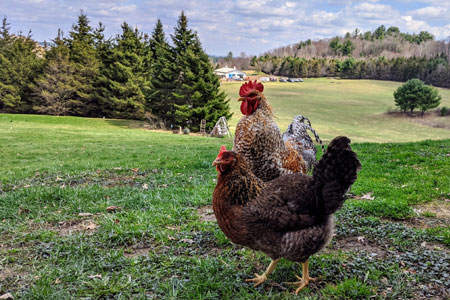
What, exactly, are free-range chickens? According to USDA, free-range chickens must be “allowed access to the outside.” That doesn’t mean they actually have to go outside. They just have to have outdoor access.
On the other hand, to many rural chicken keepers, free range means letting the chickens go wherever they wish. That’s a non-starter for various reasons, including potential for predation and the possibility of annoying the neighbors.
The most practical definition of free range is allowing chickens into a fenced area that’s large enough to maintain forage. In other words, an area larger than the average packed-dirt chicken yard.
Free-Range Disadvantages
One disadvantage to free ranging is that chickens seem to always find a way to fly over or duck under the fence. They therefore wander into places where they aren’t welcome, like the garden or back porch. A tall wire mesh fence that’s tight on the bottom helps keep them in. An electric fence is also helpful. Some breeds are more adventuresome than others, so breed selection also comes into play here.
Despite a secure fence, predators can be a problem. Even when predators can’t get through the fence, or dig under it, some can fly over it. Hawks are the major culprits, here. Chickens that are close to the coop can duck inside in the face of danger. For chickens that tend to forage away from the coop, some shrubs or a small range shelter would give them cover to duck under.
Another disadvantage is that some hens will lay their eggs in the grass or under shrubs, instead of in nests provided inside the coop. Where that’s a problem, simply keep the chickens inside the coop until late in the morning, after most of them have finished laying.
Supervised Free Range
Chicken keepers who are risk averse may opt for supervised free-range time. That means letting the chickens out of confinement only when someone is around to keep an eye on them.
That doesn’t mean they’ll be entirely safe, though. A hawk can swoop down and grab a chicken faster than you can react. And you may be astonished to learn how many people have lost chickens to their own dog. Still, supervised free range is an option for chicken keepers who spend a lot of time out in the yard.
Free-Range Advantages
Despite the few disadvantages, free ranging offers several important advantages. For starters, the chickens will be healthier. That’s partly because they’re getting lots of exercise and fresh air.
Also they are not confined to a limited area where their droppings, parasites, and potential diseases concentrate. And they are enjoying greater variety in their diet, including an assortment of seeds, tender greens, and quality protein in the form of insects.
Speaking of insects, free-range chickens help control the insect pest population. They relish ticks and anything else that hops, flies, or crawls across their path. Plus chickens that keep busy foraging are much less likely to get bored and engage in bad habits like bullying each other, or picking at themselves and other chickens.
Exclusive of housing, feed accounts for some 70% of the cost of keeping chickens. Letting the flock obtain some of their nutrients by foraging will save you a bit of money on the cost of feed.
Exactly what percentage you might save depends on the size of your flock, the quality of the forage, and the time of year. In seasons when forage is less abundant, you’ll save less, but the chickens will still enjoy all of the other benefits of free range.
Helpful Links
Best Chicken Breeds for Free Range
Chicken Breeds that Are Exceptional Foragers
Managing Forage for Free Range Chickens
And that’s today’s news from the Cackle Coop.
Gail Damerow has written numerous books about keeping poultry, many of them available from the Cackle Bookstore.


My birds are free range: red Aseel rooster, Blue Sumatra hen and Aseel-Sumatra cross hen. Consider the BREED of bird before utilizing free range as certain breeds can be rather delicate, as well as some birds probably can’t defend against predators if they are running around the yard freely as opposed to being inside a strong structure. Anecdote to share: family had Ameraucanas in a fenced coop. In the night some predator had literally pulled a hen through the 2″ or however small spaces between the fence wires! Can you imagine such torture? “Double thick” may be employed in areas with ground predators. Birds of Prey come from above but since my birds are pretty “predator savvy”, not to mention likely too heavy for a bird of prey, I am not overly concerned with them living freely.
Another big bonus of free range: Birds literally scour over the yard in search of live food. I am so grateful for, and surprised by the amount of insect control just my three adult birds provide. Their especial favorite are cockroaches and they will turn over every leaf, stone, anything to greedily eat them all up.
Heat dissipation: in Phoenix our summer got up to 120F. I would not want my birds in a “jail”, unable to fend for themselves in case of power outage or ?? at least my birds can search and in an emergency I am sure my birds could hop and fly their way out of our property- they’re not bound in any way. I like them being able to flee if they need to, or search and find every bug on the property. I like them being able to find areas that are cooler in the heat, or more to their liking- as opposed to my choice of location, that maybe they don’t like, or aren’t able to stay cool and or warm during temperature extremes.